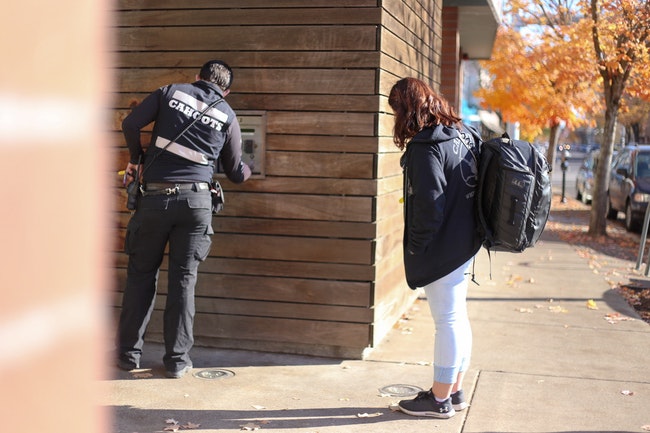
Brenton Gicker, left, and Katie Haney call up to a woman in order to check on her at her apartment. The two CAHOOTS workers responded to low-level 911 calls. (Troy Brynelson/Salem Reporter)
The Salem City Council on Monday approved a fresh start for a program to have mental health workers respond to some crisis calls, months after plans to start such a program stalled.
Councilors directed city officials to pinpoint organizations qualified to run a mobile response unit which would respond to some emergency instead of police.
Councilors voted unanimously in favor of the request, requiring city staff to identify community organizations and ask that they in turn provide a full cost estimate to run the program.
It would at that point be the council’s decision whether to award the program to one provider or multiple, Interim City Manager Kristin Retherford said at the meeting.
Councilor Vanessa Nordyke, who brought forward the motion for the request, said it’s the biggest step toward adding a non-police mobile crisis response program in Salem since she first raised the idea in a work session in 2019.
Nordyke told Salem Reporter she has some potential candidates in mind, and that it is “entirely possible” multiple organizations or businesses help run different aspects of the program such as mental health or medical response.
“I have had some preliminary conversations, but I can’t share who they are just yet,” she said Tuesday.
Efforts last year to create a crisis response program through United Way of the Mid-Willamette Valley stalled after funding issues and a lack of interest from Marion County leaders.
The program had received broad support from Salem residents who testified as the city was planning its upcoming budget. Nearly 100 people wrote to the budget committee asking members to recommend funding for a program and more than a thousand signed a petition.
Councilors voted during a May 2021 budget committee meeting to approve $135,000 for the program, and were expecting state grant funds to help cover the remaining $540,000 bid submitted by United Way.
But House Bill 2417 was changed to exclude cities from directly requesting state funding for mobile crisis units, Nordyke said, and city officials learned the grant money they’d hoped to use in Salem was only available to counties.
Meanwhile, county officials didn’t want to pursue a program that overlapped with crisis response services already in place.
“I remain willing and able to work with Marion County and Polk County, and frankly, anyone else who wants to bring a mobile crisis unit to Salem. Perhaps our downtown businesses who would like to be supportive, because my belief is that this project would primarily serve the downtown core,” Nordyke said. “This is intended to be an open process and everyone is welcome to step forward and be a part of the solution.”
A similar program in Eugene, CAHOOTS, has drawn national attention in recent years as more U.S. cities look for alternatives to law enforcement responding to mental health concerns.
Nordyke at the council meeting called the unit, run by White Bird Clinic, “the national model.”
“I’ve met with many of these partners over my two years on council. These are the boots on the ground that do the relationship building needed to run a crisis unit,” she said.
Councilor Chris Hoy said at the meeting that the requests for qualifications will ultimately give clarity to what costs the city would face to start the program.
“It’s going to take all of these sort of big bits of information and really tell us what’s available in the community, who has the capacity to deliver such a program and what is it really going to cost in our community to deliver,” he said.
Councilor Trevor Philllips said he “in spirit” supports taking steps toward a civilian-led mobile crisis response unit, but added he was concerned the idea would divert attention away from the existing Mobile Crisis Response Team run by Marion County, which pairs police with mental health workers to respond to crisis calls.
Another program, the Marion County Sheriff’s Office’s Law Enforcement Assisted Diversion program, connects people who commit low-level crimes with social services rather than the criminal justice system.
Regarding paying to expand police-led crisis response instead, Nordyke said, “I will wait to see the city manager’s proposed budget and reserve judgment on other potential programs.”
Contact reporter Ardeshir Tabrizian: [email protected] or 503-929-3053.
JUST THE FACTS, FOR SALEM – We report on your community with care and depth, fairness and accuracy. Get local news that matters to you. Subscribe to Salem Reporter starting at $5 a month. Click I want to subscribe!
PRIOR COVERAGE:
Mental health workers, not police, could be responding to calls in Salem by August
Salem Budget Committee recommends funding for mobile unit to respond to crisis calls
Salem residents call for a crisis response team in city budget
‘You want a resolution as much as possible’: Six hours with Eugene’s mobile crisis intervention team
Salem nonprofits looking at Eugene’s model for mobile crisis response









